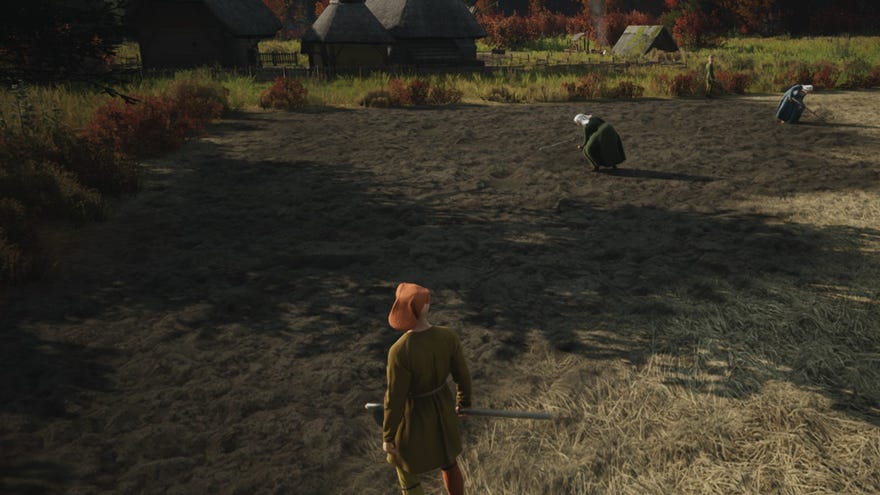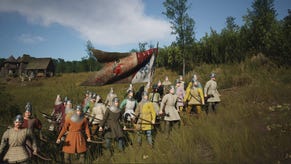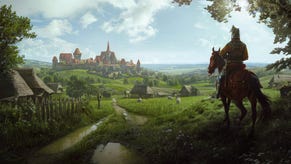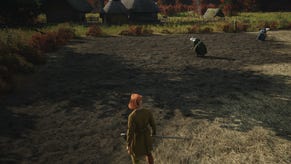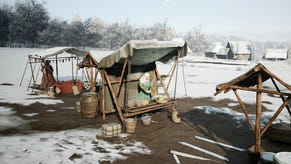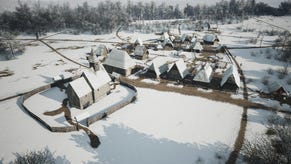What did a medieval peasant’s raw, sour breath sound like? Manor Lords’ composers tell us
“Greg’s got a fantastic ear.”
The story of Manor Lords’ soundtrack begins, as all inspiring tales do, with hunched-over late-night doom scrolling. It was pre-covid, and Pressure Cooker Studios’ composer Daniel Caleb was flicking through reddit posts when a trailer cut through the glare. He’d never heard of Manor Lords before. It looked like a new IP, but already had a huge Reddit following. Caleb loved what he saw. At that point, Pressure Cooker mainly worked on film scores, but both Caleb and fellow composer Elben Schutte had always wanted to eventually move on to bringing their storytelling from cinema to games. Even more so than film, games were the passion. Manor Lords would be perfect for them.
Manor Lords’ creator Greg ‘Slavic Magic’ Styczeń has always been active on Reddit, so it didn’t take Caleb long to find and send the Polish developer a message from his Cape Town studio. He soon joined the official Discord, but Styczeń was getting a lot of messages and being - at that time - a solo dev working out of his flat, he wasn’t exactly flush with resources. However, he did say exactly what kind of music he had in mind for his medieval town builder:
“I’m really looking for something fresh and organic for the sound track, with real instrument players - not just sampling. The textures of the soundtrack need to be unique. Something that hasn’t been done to death,” he told them. Styczeń also wanted jam sessions - improvisational elements to the tracks that authentically captured the folk traditions of the period. The problem was, says Caleb, authentic sounds and real instruments don’t come cheaply, and Styczeń just didn’t have the budget at that point. The game was becoming popular, but nowhere near the level of attention it would later gather.
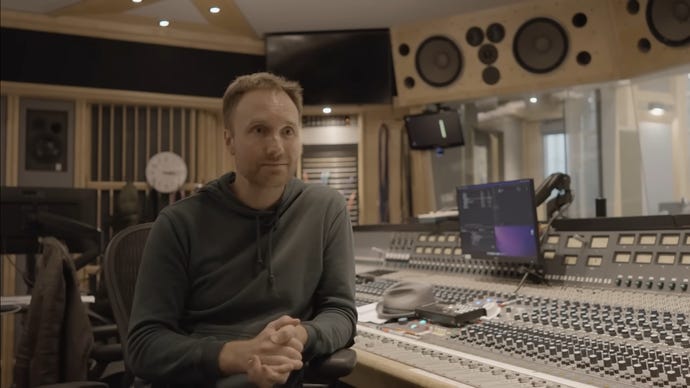
Caleb says Pressure Cooker could do the initial stage really cheaply, they already had a whole network for collaboration. "He sent us a bunch of references. He’d already been collecting medieval music, like ancient choral music and instrumentals that he’d just been looping in the background of the game while he was playing," Caleb tells me. "So he’d already spent a year or two in game with these ancient tunes and folk songs and what not.”
They put together a track named The Peasants. Caleb says that “the magic that really grabbed it for Greg is that we used live winds,” from multi-instrumentalist Simon ‘Fuzzy’ Ratcliffe (Chivalry 2, Guild Wars 2). That, and a baroque violin. “That was kind of the magic element that made him say: I want to work with you guys.”
“The baroque violin is a renaissance instrument - so technically not medieval - but its strings are made from sheep gut, so it’s got this really ancient sound to it,” says Ben Schutte. “The texture of it really captured the world that [both Styczeń and Pressure Cooker] were envisaging.”
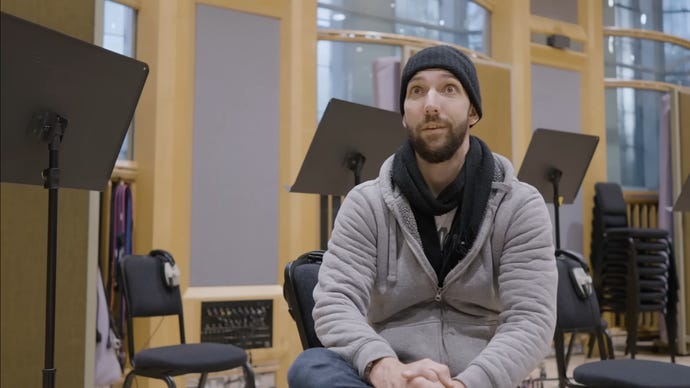
“We’re all Witcher soundtrack fans, even Greg, but we quickly found out the difference between fantasy and medieval,” laughs Caleb. “Fantasy does not work for Manor Lords, we found that out really early on.” Instead, they looked to other games for references. Civilisation 6 and A Plague Tale - “a wonderfully dark, live sort of score.” Burning The Past from film Kingdom Of Heaven, by Metal Gear Solid composer Harry Gregson Williams, was also a big reference point.
Styczeń’s other wishlist item for the soundtrack was period-authentic choral chants. Pressure Cooker ended up using two types: existing, historical choral chants from the 12th to 14th centuries, and their own compositions. Sometimes, they’d mix both together to compliment the game. For the track Kings And Paupers, they looked to a 14th century manuscript named Libre Vermell de Montserrat, which still sits today in Montserrat Abbey, just outside Barcelona. A collection of devotional texts, it was compiled to “have something pious for pilgrims to sing and dance to.”
“The monasteries were worried that pilgrims and the general riff-raff were coming in to these monasteries and mixing pagan music with the religious music. So they desperately wanted to record and notate these religious songs to preserve them,” says Caleb. Authentic as they come then, although as you might imagine, they weren’t the easiest to adapt. “Ancient score looks completely different to modern score,” says Schutte.
“This is completely new to Ben and I by the way. We’re not medieval scholars!” adds Caleb.
“Well,” laughs Schutte, “we like to think we might be now.”
Despite working from these long ago-notated arrangements, Pressure Cooker still had space to improvise. Caleb says the lovely thing about these choral pieces is they’re “quite monophonic”, so it’s easy to add modern cinematic flourishes like drones. “We found as soon as soon as we tried to put a clasp around having control around every single bar, note, or beat, it would suck the life out of this sort of organic performance that would have been the case in those days,” Schutte explains. “They didn’t have these kinds of rigid structures we have as modern composers.’ When they approached things from just wanting to make “pretty choral music” things would sound “too modern - too fantasy.” Another thing they’d have to get used to, as modern composers, was Styczeń’s own taste in audio fidelity.
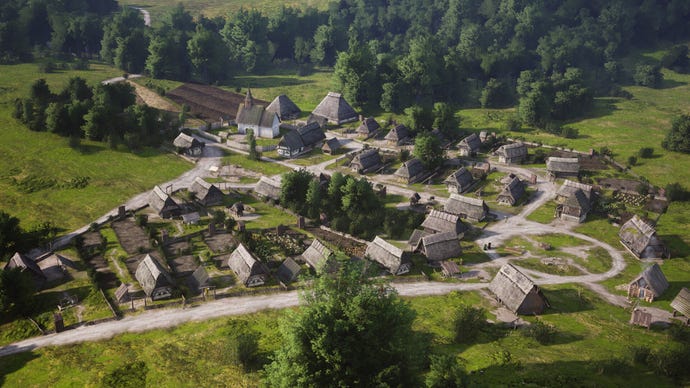
“Greg’s got a fantastic ear,” says Caleb. “He’s a multi talented guy. But the interesting thing is, as musicians and recorders, we like hearing pristine things. We spend thousands on microphones [and equipment]. But with Greg, he liked a rough, dirty sound that we weren’t used to.” They would put together an “incredible, pristine” recording in the studio, painstakingly mixed until they were happy with it. Then, there’d be the demos - mock-ups they’d slapped together in a bedroom. “Not mic’d up properly. No engineer. And Greg would say ‘no, I prefer that’. That’s something we’d have to get our heads around, because we’re always looking for perfection, right?”
“Greg recorded his hometown choir. There’s little noises and breathing, but there’s an authenticity to it. The music isn’t necessarily Polish, but I think it has a ‘Slavic Magic’ uniqueness to it,” says Caleb. Schutte adds that, “In terms of the pursuit of authenticity, the nature of medieval instruments are quite unpolished.” They weren’t completely bound by this push for authenticity, though. Although the medieval focus was key, Styczeń still wanted “moments of breath” - wider cinematic score pieces like the type Pressure Cooker were used to. This way, Styczeń hoped there’d be a contrast in intensity so that “the medieval music wouldn’t be as a tiring as it is to some people”
As I pondered a little in my review, Manor Lords struck me - despite the name - as more interested in the lives of its peasants than the nobility. Turns out, it wasn’t a coincidence.
“It’s so much about the hardship of the peasant,” Schutte says. “Their relationship to music. That’s why it was important to tackle it twofold - folk and church - because church was such a huge part of their lives, this overarching authority that governed them.” Between composing and playing Manor Lords, both Caleb and Schutte say they often felt a sense of “otherworldliness”. They'd hang on to that feeling and strive to incorporate it, to capture the sense of the average medieval person’s perception of this sacred music. To those peasants, says Schutte, it was a glimpse of “the absolute ultimate state of everything”.
The other side of this church/tavern, choral/folk dichotomy, says Schutte, was them trying to capture the feeling of hardship of everyday life. “We came up with this catchphrase we kept throwing back and forth at each other - ‘the peasant’s breath’. We imagined a peasant, no personal hygiene, struggling in the field, who has this sort of raw, sour kind of breath - and what does that sound like?”

“And death,” says Caleb, “is around the corner all the time. In the early renditions of the game, it was a lot more hardcore than it is now. Before you knew it, your pop was just dwindling.” Before the interview, I’d imagined moodboards full of bucolic summer-scapes and winter snows to inspire composition. Instead, Caleb says, they ended up with screengrabs of “random dead peasants.” That’s often, says Schutte, why they focused so heavily on bowed instruments “A bowed medieval instrument has this raspiness and roughness to it that was really right for this setting.”
Schutte says the success of Manor Lords hasn’t quite sunk in yet, and they both agree that watching it blow up has been “surreal.” They’re excited about what the future brings for Pressure Cooker (they’re “having conversations” about future content) but mostly, they just seem happy for Styczeń. “To know Greg over the last three or four years, to see the success of the game, it’s been amazing,” says Caleb “He’s really poured the best years of his life into doing this game. He’s given everything. It’s amazing to see it paying off.”
Manor Lords’ digital soundtrack is available now from Laced Records.
